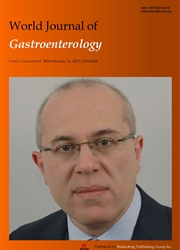

 中文摘要:
中文摘要:
Currently,the main treatment for hepatocellular carcinoma(HCC)involves the surgical removal of tumors or liver transplantation.However,these treatments are often not completely curative,as they are associated with a risk for postoperative recurrence and metastasis.Circulating tumor cells(CTCs)are increasingly recognized as the main source for recurrence and metastasis after radical hepatectomies are performed.Many studies have demonstrated the association between the presence of either pre-or postoperative CTCs and an increased risk for HCC recurrence.To improve the therapeutic outcome of HCC,a personalized,comprehensive and multidisciplinary approach should be considered,involving the application of appropriate diagnostic and therapeutic measures targeting HCC CTCs in different stages throughout the course of treatment.This article proposes some HCC CTC-based strategies for the treatment of HCC,including the monitoring of HCC CTCs before,during and after radical hepatectomy,therapeutic targeting of HCC CTCs,prevention of the generation and colonization of CTCs,as well as the use of CTC indexes for the selection of indications,prediction of prognoses,and planning of individualized therapeutic regimens.Innovation and technological development of therapies targeting CTCs,as well as their translation into clinical practice,will help to effectively reduce postoperative recurrence and metastasis,and significantly prolong the survival of HCC patients.
 英文摘要:
英文摘要:
Currently, the main treatment for hepatocellular carcinoma (HCC) involves the surgical removal of tumors or liver transplantation. However, these treatments are often not completely curative, as they are associated with a risk for postoperative recurrence and metastasis. Circulating tumor cells (CTCs) are increasingly recognized as the main source for recurrence and metastasis after radical hepatectomies are performed. Many studies have demonstrated the association between the presence of either pre- or postoperative CTCs and an increased risk for HCC recurrence. To improve the therapeutic outcome of HCC, a personalized, comprehensive and multidisciplinary approach should be considered, involving the application of appropriate diagnostic and therapeutic measures targeting HCC CTCs in different stages throughout the course of treatment. This article proposes some HCC CTC-based strategies for the treatment of HCC, including the monitoring of HCC CTCs before, during and after radical hepatectomy, therapeutic targeting of HCC CTCs, prevention of the generation and colonization of CTCs, as well as the use of CTC indexes for the selection of indications, prediction of prognoses, and planning of individualized therapeutic regimens. Innovation and technological development of therapies targeting CTCs, as well as their translation into clinical practice, will help to effectively reduce postoperative recurrence and metastasis, and significantly prolong the survival of HCC patients.
 同期刊论文项目
同期刊论文项目
 同项目期刊论文
同项目期刊论文
 Detection of circulating tumor cells in hepatocellular carcinoma using antibodies against asialoglyc
Detection of circulating tumor cells in hepatocellular carcinoma using antibodies against asialoglyc Targeting of circulating hepatocellular carcinoma cells to prevent postoperative recurrence and meta
Targeting of circulating hepatocellular carcinoma cells to prevent postoperative recurrence and meta pERK/pAkt phenotyping in circulating tumor cells as a biomarker for sorafenib efficacy in patients w
pERK/pAkt phenotyping in circulating tumor cells as a biomarker for sorafenib efficacy in patients w The biological and clinical importance of epithelial-mesenchymal transition in circulating tumor cel
The biological and clinical importance of epithelial-mesenchymal transition in circulating tumor cel 期刊信息
期刊信息
